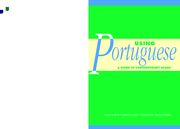Book contents
- Frontmatter
- Contents
- List of abbreviations
- Acknowledgments
- 1 Introduction
- 2 Written expression
- 3 Vocabulary
- 4 Nouns and adjectives
- 5 Verbs
- 6 Reported speech
- 7 Pronouns and articles
- 8 Adverbs
- 9 Comparatives and superlatives
- 10 Interrogatives
- 11 Fields of meaning – vocabulary extension
- 12 Portuguese for Spanish speakers
- Index of Portuguese words
1 - Introduction
Published online by Cambridge University Press: 05 June 2012
- Frontmatter
- Contents
- List of abbreviations
- Acknowledgments
- 1 Introduction
- 2 Written expression
- 3 Vocabulary
- 4 Nouns and adjectives
- 5 Verbs
- 6 Reported speech
- 7 Pronouns and articles
- 8 Adverbs
- 9 Comparatives and superlatives
- 10 Interrogatives
- 11 Fields of meaning – vocabulary extension
- 12 Portuguese for Spanish speakers
- Index of Portuguese words
Summary
Portuguese is currently the mother tongue of nearly 200 million speakers and the official language of eight countries: Angola, Brazil, Cape Verde, East Timor, Guinea Bissau, Mozambique, Portugal, and São Tomé and Príncipe. It is currently growing in number of speakers owing to population explosions in most of these countries. There are also many creole varieties of Portuguese when it combines with native African languages. There are many variants of Portuguese, both within and between its different nations, including differences from northern to southern Portugal and a variety of phonological and lexical differences found in Brazil. The Portuguese language is traditionally broken into two major types: European Portuguese, which is spoken in Portugal (and includes the variations spoken in the Azores and Madeira archipelagos) and Africa (albeit with some differences); and Brazilian Portuguese.
In both European and Brazilian Portuguese there are major subdivisions. In the Portuguese of Portugal, the standard dialect is that of Lisbon and/or Coimbra, while some of the major variations are spoken in the islands of the Azores and Madeira, and in Northern Portugal. In Africa, the variants of Portuguese are enriched in vocabulary through contact with the various indigenous African languages and they have acquired their own pronunciation and some special verbal inflections. African vocabulary (mostly Kimbundu) can also be found in Portuguese from both Portugal and Brazil, being more abundant in the latter.
- Type
- Chapter
- Information
- Using PortugueseA Guide to Contemporary Usage, pp. 1 - 34Publisher: Cambridge University PressPrint publication year: 2004



